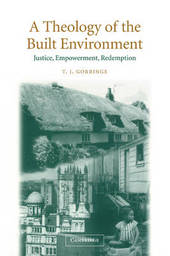
|
A Theology of the Built Environment: Justice, Empowerment, Redemption
Paperback / softback
Main Details
| Title |
A Theology of the Built Environment: Justice, Empowerment, Redemption
|
| Authors and Contributors |
By (author) T. J. Gorringe
|
| Physical Properties |
| Format:Paperback / softback | | Pages:296 | | Dimensions(mm): Height 229,Width 152 |
|
| Category/Genre | Architecture
Christian theology |
|---|
| ISBN/Barcode |
9780521891448
|
| Classifications | Dewey:261.57 |
|---|
| Audience | | Professional & Vocational | |
|---|
| Illustrations |
Worked examples or Exercises
|
|
Publishing Details |
| Publisher |
Cambridge University Press
|
| Imprint |
Cambridge University Press
|
| Publication Date |
11 July 2002 |
| Publication Country |
United Kingdom
|
Description
Tim Gorringe's is the first book to reflect theologically on the built environment as a whole. Drawing on a wide range of both theological and social-scientific sources, Professor Gorringe explores Christianity in its urban settings, focussing on the use of space, design, architecture, and town planning to make a theological critique. After considering the divine grounding of constructed space, he looks at the ownership of land, the issues of housing, town and country, and the city, and then considers the built environment in terms of community and art. The book concludes with two chapters that set the whole within the framework of the environmental crisis and asks what directions the Church should be looking for in building for the future. This unique book will challenge not only theologians, ethicists and sociologists of religion but also church teachers and professionals.
Author Biography
Tim Gorringe is Professor of Theological Studies at Exeter University. He is the author of many books including God's Just Vengeance (Cambridge, 1996), and Karl Barth: Against Hegemony (1999).
Reviews'Professor Gorringe's book gives us plenty to think about.' Church Times 'This is a brilliant, creative, sustained, wide ranging and enormously erudite contribution ...' International Journal for the Study of the Christian Church 'This is clearly a most important book, which, it is to be hoped, will spur other writers to pursue this vital subject, which affects every member of the world population.' Evangelical Quarterly
|